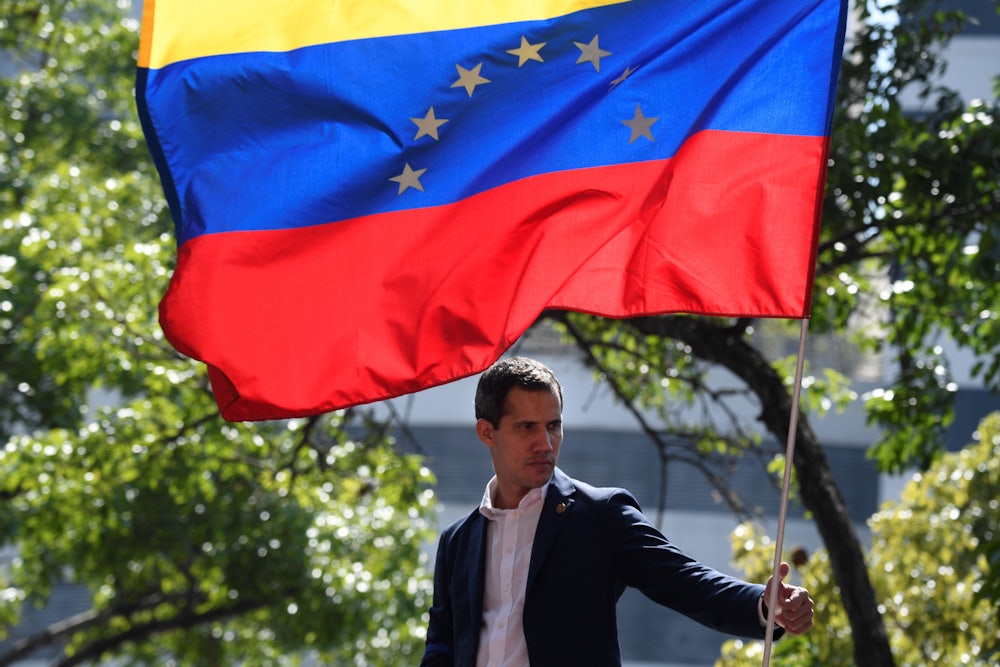The Hawthorne effect refers to the tendency of individuals to behave differently when they know they’re being observed. It’s on prominent display right now in Venezuela. On April 30, National Assembly speaker Juan Guaidó, after months of quixotic agitation involving travel and interviews, took to the streets with a smattering of armed soldiers to demand yet again that President Nicolás Maduro resign. The day quickly dissolved into clashes between protesters and security forces, and currently looks set to continue at least another day.
There is much about the current situation in Venezuela that future historians will have to piece together. One major question is what exactly the United States, which has come out strongly in favor of Guaidó, is doing behind the scenes to force Maduro’s ouster. Until that part of the story is clear, any analysis will be incomplete. What is obvious, however, is that the situation is not moving as quickly as Guaidó and his boosters in the Trump administration and elsewhere assumed when the speaker proclaimed himself interim president in January. Contrary to Guaidó’s hopes, the military has not abandoned Maduro en masse. Direct international intervention also remains unlikely, with Washington seemingly unwilling to commit troops and the neighboring Brazilian government, despite its far-right inclinations, ruling out any participation in a military campaign against Maduro’s self-styled socialist government. Guaidó has thus been reduced to managing expectations and trying to maintain international interest in Venezuela’s dire situation. The latter seems to be his only plausible path to power.
The very fact that Maduro’s regime did not immediately collapse when Guaidó anointed himself the country’s legitimate ruler four months ago seemed to suck the air out of Venezuela as a global front-page story. The country’s economic situation—food and medication shortages, power outages, and other infrastructure problems going back over a year—remains critical, but without consistent momentum on the part of those pushing against Maduro, Venezuela has, until Tuesday’s dramatic showdown, largely receded from the forefront of public debate around the world. For Guaidó, a lack of international attention almost certainly spells defeat. On his own, with the military remaining loyal to the established regime, he has vanishingly few options.
As historian Alejandro Velasco tweeted on Tuesday morning, therefore, Guaidó’s latest gambit “is not actually about instigating a military uprising, but about forcing Maduro to arrest him, generating new scenarios in terms of international pressure.” On Tuesday morning, Guaidó headed to La Carlota air base in Caracas alongside former opposition leader Leopoldo López, who has been under house arrest for two years (Maduro has called López a “fascist murderer”). López was apparently released from his confinement by dissident authorities. Together, with apparent support from a handful of soldiers, the two men urged people to take to the streets against Maduro. Respected Venezuelan journalist Luz Mely Reyes wrote on Twitter Tuesday that her sources suggested the uprising had actually been planned for a later date and counted on more substantial military support; Guaidó, however, got word that he would be arrested imminently and thus acted ahead of schedule. Tuesday’s demonstrations, despite the initial surprise of seeing a handful of military members at Guaidó’s side as he seized a Caracas air force base, ultimately fizzled—though at the cost of dozens of injuries.
Guaidó does not seem to be shifting public opinion within Venezuela in any meaningful way. Yet, by playing to audiences beyond his country’s borders and personalizing the stakes of the power struggle in Venezuela, he continues to enjoy the support of foreign governments. That those foreign governments might bring their force to bear against the regime, an unlikely prospect in the short term, remains Guaidó’s only real chance at the presidency. This explains his desperate attempts to keep alive the flame of foreign investment in his personal crusade. In other words, the abiding knowledge that he is being watched by anti-Maduro forces the world over is almost certainly driving Guaidó’s actions as much as events on the ground in his home country.
That’s not to say that these calculations are as simple as they might first appear. How many times can Guaidó fail to wrest control from Maduro before his grandiose stunts begin to lose their salience? If Guaidó continues to fall short of his ultimate objective, will the attention and support of international observers, to say nothing of foreign governments, begin to slip away? The realization that time is not necessarily on his side, and that he may not be the only one seeking to claim the mantle of opposition leader, if López’s resurgence is any indication, is almost certainly driving Guaidó’s risky strategy of employing public spectacle as a means of stimulating regime change.
Maduro, of course, is also attuned to foreign scrutiny of his government, even if he is less dependent on the goodwill of Trump, Canadian prime minister Justin Trudeau, and French president Emanuel Macron than Guaidó is. (Maduro cares much more about the opinions of Moscow, Beijing, and, to a lesser extent, Havana.) To hear U.S. officials such as Secretary of State Mike Pompeo and White House national security adviser John Bolton tell it, Maduro was ready to flee to Cuba on Tuesday and hand power to Guaidó, stopping only because Russia “indicated he should stay,” in Pompeo’s words. Whether or not this particularly extreme example of external pressure is true—Pompeo declined to offer supporting evidence—there is a reason the regime has not arrested Guaidó: Doing so might provide a pretext for drastic action from abroad.
While Maduro remains in control, the political situation in his country is clearly unsettled, with political actors calibrating their performances to meet foreign expectations rather than the immediate needs of ordinary Venezuelans. Whether that would change under Guaidó is, at present, anyone’s guess. But for now, a crisis with profound effects on millions of Venezuelans is being propelled in no small part by foreign, rather than domestic, opinion.
